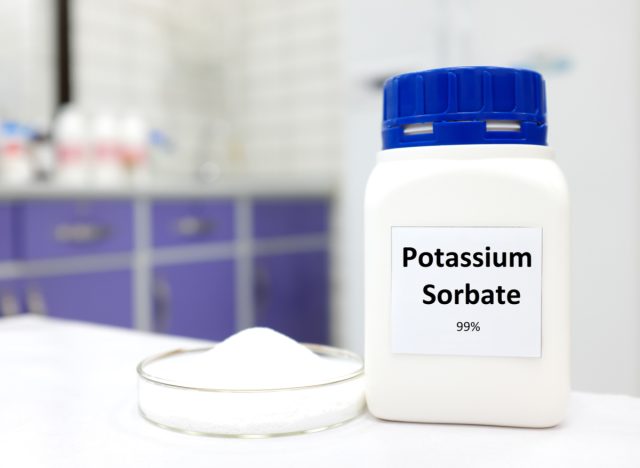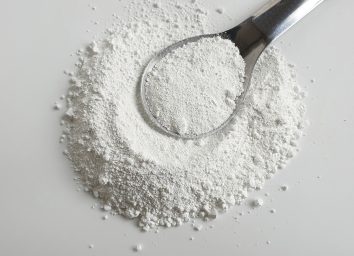What Is Potassium Sorbate? And Why It’s in Your Food

Potassium sorbate is a common ingredient you’ll see on many food and beverage items throughout the grocery store. You might even see it listed in some of your favorite beauty products. And while “potassium” might be a recognizable term, the term “potassium sorbate” might not be quite as familiar to you—which makes you wonder what it is and whether or not it’s actually a good idea to consume it. Find out more about this chemical compound when you keep reading and then read about more food crimes we’re talking about right now.
What is potassium sorbate?

Potassium sorbate is a chemical compound of sorbic acid and potassium chloride. The compound is antimicrobial and made up of unsaturated fatty acids, and it’s found in many food products. It’s often made synthetically, though it was originally created from berries from an ash tree.
What does potassium sorbate do?
Potassium sorbate is used in foods primarily as a preservative. It can also be used in drinks and even personal care products. Potassium sorbate is primarily used to stop the growth of mold and fungus in your food. It has no color or smell, which makes it easy to blend into food products and beauty products. It won’t affect how your food or drink tastes when it’s included, it’ll simply keep it from going bad too quickly.
Is it safe to consume potassium sorbate?
Though the idea of a chemical additive can be concerning, the FDA views potassium sorbate as generally safe. “This substance is generally recognized as safe when used in accordance with good manufacturing or feeding practice,” the organization states on its website.
That being said, some people may prefer to not consume any substances that aren’t naturally found in their foods, as there is always a potential for side effects. “Although the FDA states that potassium sorbate is generally recognized as safe (GRAS), it is still best to limit food additives that could possibly trigger an inflammatory response,” says Alyssa Wilson, MS, RDN, LD, who is a metabolic success coach for Signos. “You can avoid potassium sorbate by reading the food ingredients label, limiting processed foods, and choosing to eat a whole-food, anti-inflammatory diet.”
Studies have shown a connection between some preservatives, including potassium sorbate, and inflammatory responses. While potassium sorbate generally passes through your digestive system without collecting, it could still trigger a side effect in some people. It’s also possible to have an allergic reaction to potassium sorbate, though it’s rare.
And because potassium sorbate can also be found in skincare products, it’s worth noting that the Environmental Working Group considers potassium sorbate to be low risk when it comes to irritation on the skin.









